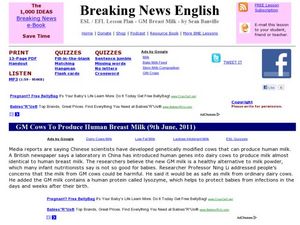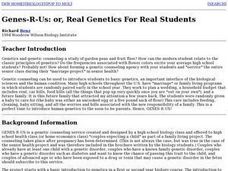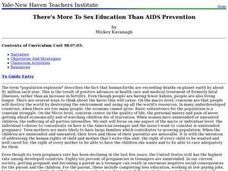California Academy of Science
Coral and Chemistry
Using cabbage juice as a pH indicator, future scientists explore the effect of increasing carbon dioxide on the pH of the ocean and relate it to the health of coral reefs. Ideal for an earth or environmental sciences course, this lesson...
Curated OER
Human Genetics Lesson
Youngsters are assigned the task of interviewing a family member or a neighbor and asking them about any genetic disorders that are present in their family history. They pretend that they are about to have a baby that is carrying a...
Curated OER
Building a Baby
Middle schoolers study the fetal development of humans. In this development lesson students divide into groups and research the different gestational weeks of a fetus.
Curated OER
Human Embryology
Ninth graders are introduced to the concept of human embryology. Individually, they complete an exercise in which they determine which trait they got from which family member. In groups, they identify and label the reproductive organs...
Curated OER
Rock-a-bye Babies in a Wetland
Young scholars review the way human babies grow and what type of care they need. Using the internet, they are introduced to five different wetland habitat animals and how their babies grow. They discover how they are born and what the...
Curated OER
One + One=One
Learners discover that learning can be fun. Problem solving skills are developed through various writing skills. Empower students with personal concept development and time management. Document growth and success of the learner....
Curated OER
Breaking News: GM Cows to Produce Human Breast Milk
Students explore current events by reading and analyzing an article in class. In this human diet lesson plan, students read an article about cows which are being genetically modified in order to produce human breast milk for consumption....
Curated OER
The Effects of "Recreational" Drugs on the Development of Chick Embryos as a Model for Human Embryogenesis
Young scholars conduct experiments on fertilized chicken embryos to determine the possible developmental effects that various recreational drugs (caffeine, alcohol, nicotine, and aspirin) might have on them.
Curated OER
Geological Development of Indiana and the Movement of Peoples Across the State
Fourth graders examine the geological development of the state of Indiana. Using the internet, they interact with the United States Geological Survey. They identify earthquake zones and energy resources in the state. They work...
Curated OER
Connections Between World Events, Geography and the Human Quest for Knowledge
Young scholars examine the relationship between innovations in geography and world events. Using maps, they report different information from a spatial perspective. They develop hypothesis about how man's quest for knowledge has...
Curated OER
LIFE IN SPACE Human Body: An Un-Earthly Home
Students examine an effect of zero gravity on the human body using a baby food jar, balloons and a jar with a large mouth.
Curated OER
The Population Explosion: Causes and Consequences
Students use this lesson to focus on population growth and the threat of overpopulation. In groups, they analyze the world birth and death rates to determine the growth rate of the population. As a class, they discuss the causes and...
Curated OER
Building A Bug Bungalow
Students chart how milkweed bugs grow and change. In this growth and life stages lesson, students read two stories and discuss how and why things grow. Students brainstorm what can be measured about humans, review and discuss life...
Curated OER
Genes-R-Us: or, Real Genetics For Real Students
Students explore genetics and genetic counseling. They research information on human genetic disorders. Students simulate developing a complete counseling service to assist the community.
Curated OER
There's More To Sex Education Than AIDS Prevention
Pupils are introduced to the views on sexuality in the United States. In groups, they research data from five countries and compare them with the United States. Using the information, they develop reasons why the teenage pregnancy rate...
Curated OER
Water Pollution Lesson Plan: Don't Trust Your Eyes
Young scholars develop a list of actions they could perform that would protect our water resources from pollution. They formulate hypotheses, conduct experiments and draw conclusions about actual pollutants found in our water supply.
Curated OER
STS Biology - Teaching Controversial Topics
Each of the three activities submitted presents difficult science topics in the context of the human experience. The activities focus on real-world problems, which have science components, from the pupils' perspectives.
Curated OER
JUST A MATTER OF TIME
Young scholars recognize the dynamic changes in themselves and in agriculture that have occurred through the years. They are shown pictures of a baby or students are asked to think of their little brothers or sisters or themselves in...
Curated OER
What Happens in the First Nine Months?
Young scholars identify their feelings and learn constructive ways of handling conflict. In this conflict lesson students discuss their feelings and when they are feeling a certain way what they can do to remedy the situation.
Curated OER
Don't Trust Your Eyes
Students brainstorm a list of possible actions that they could do to protect the water resources from pollution. They create hypotheses and conclusions by completing experiments and observing different pollutants.





















